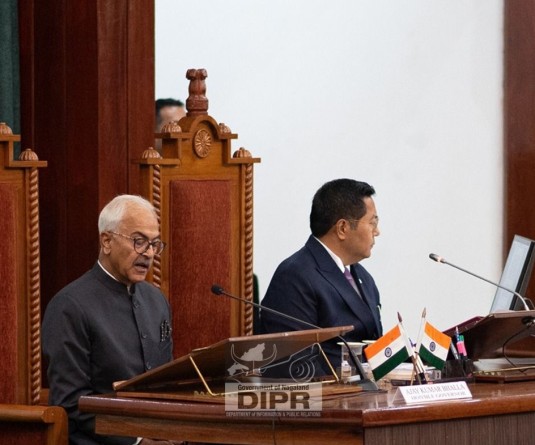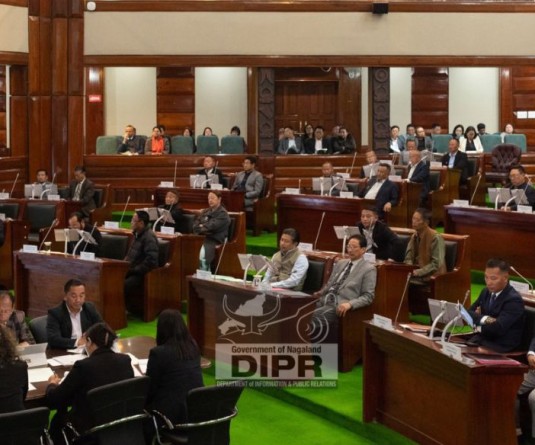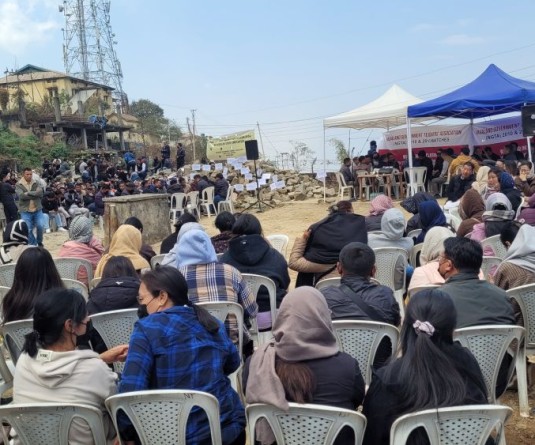
Flags disparities citing data, calls for fair and transparent system
Phek, June 11 (MExN): The Chakhesang Public Organisation (CPO) has reiterated its call for a comprehensive review of Nagaland’s job reservation policy, urging the State Government to constitute an independent commission with full autonomy to reassess the existing system.
Citing data, the CPO Committee on Job Reservation flagged significant disparities in tribe-wise employment figures and called for a fair, transparent, and data-driven reservation mechanism that ensures equity across all communities.
According to the organisation, it had called for a total review of what it termed the “outdated Backward Tribes (BTs) Reservation” of 1977 as early as October 17, 2010.It now demands that the review be carried out by an independent commission, comprising members with subject expertise and diverse backgrounds, empowered with “maximum autonomy."
Among other points, the CPO said the parameters of such a review should include all existing tribes, including the unreserved tribes of Nagaland, to establish a benchmark or yardstick.
This benchmark should be based on current statistics, latest population data in consonance with tribe-wise employment figures, and comprehensive economic survey reports to provide an accurate reference point.
AS per the CPO, the State Government has over the years issued various notifications and modified the policy arbitrarily, creating sub-classifications and piecemeal reservations within already classified groups, without conducting the mandatory policy review as required by the original notification.
This has deprived some deserving tribes of equal and proportionate reservation, it argued.
Several BT Reservation Committees were constituted, but their findings were never tabled in the Assembly for review or amendment, it pointed out.
Thus, the BT reservation policy has suffered several setbacks and failed to achieve its objectives, the CPO added. It also criticised the State’s roster policy and recruitment guidelines for lacking meritocracy and maintained that thee absence of cut-off marks in recruitment has compromised the quality of employees.
The provisions of the roster policy have, in some instances, prevented the recruitment commission from recommending qualified candidates for technical posts due to the lack of candidates from specific tribes, resulting in indefinite backlogs in some departments.
This situation, the CPO stated, is a result of policy paralysis, where posts reserved for a particular tribe are carried over indefinitely, depriving other qualified candidates of the opportunity.
It further noted that the Chakhesang tribe was the only BT excluded from the Directorate of Underdeveloped Areas (DUDA), although several areas in the district—particularly the Tizü range—were identified as “most backward and remote” in various reports.
By accepting job reservation benefits, the Chakhesang tribe was also deprived of other entitlements such as the Backward Region Grant Fund (BRGF) and Border Area Fund, which were extended to all other BTs and even some advanced tribes, it maintained.
Highlights population-job imbalance: The CPO stated that the Chakhesangs continue to struggle for economic sustainability and lack job parity with more privileged groups.With a population of approximately 154,874, the Chakhesangs held a mere 2% and 3% of reserved seats until 2011, which increased to 4% following a notification dated April 14, 2011, it said.
This is also shared with tribes having an average population of around 50,000, a situation the CPO described as a violation of the reservation policy caused by an arbitrary roster system that lacks merit-based standards.
Citing statistics, the CPO highlighted that the Chakhesangs rank 8th in Nagaland’s tribe-wise job index based on population-to-employment ratio, indicating limited progress despite decades of job reservation. Several meritorious Chakhesang candidates qualifying under the general category are also counted under reserved seats, thereby denying opportunities to other deserving members of the community, it alleged.
Quoting PIMS and Census of India data, the CPO said tribes with employee percentages exceeding their population share include Angami, Ao, Lotha, Phom, Sangtam, Sumi, and Pochury, while Chakhesang, Chang, Khiamniungan, Konyak, Rengma, Yimchungrü, Tikhir, and Zeliang fall below.
Citing ‘category-wise employment data,’ the CPO stated that the five unreserved tribes enjoy a significantly higher share of government jobs relative to their population, while the percentage for BTs, including Chakhesangs, remains considerably lower.
As per the data provided by the CPO, the Ao tribe has the highest percentage (17.03%) of category-wise number of employees at 21,093, followed by the Sumi (18,469 or 14.94%) and Angami (13,256 or 10.71%). In terms of absolute numbers, the Tikhir had the lowest at 113, followed by the Pochury (1,676) and Khiamniungan (2,509).
There were 7,761 employees from the Chakhesang tribe, comprising 6.27% of the State’s total.
The numbers were based on the total employee count of 1,23,826 in Nagaland and could not be independently verified.
Despite comprising the highest number of sub-tribes, the Chakhesangs continue to face educational and economic challenges and remain underrepresented in government services, the CPO stated. It further recalled that the State Government had acknowledged these challenges as early as 1966, when it introduced job reservations under Article 16(4) of the Constitution for candidates proficient in Naga dialects.
It also criticised the Nagaland Public Service Commission (NPSC) for lacking tribal parity and urged the government to overhaul the structure to restore fairness and public trust.
Highlighting the widespread use of backdoor, ad-hoc, and contract appointment which it it claimed disproportionately benefit advanced communities, the CPO called on the State Government to address structural imbalances and ensure equity for underrepresented groups.






